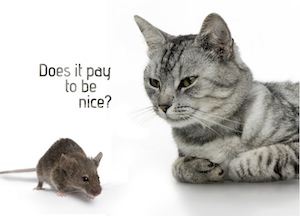
Does it pay to be nice?

Yes, it does. And we're not just talking about that warm fuzzy feeling inside. Maths indicates that it pays in evolutionary terms too. The following articles introduce you to this topic and show you the wider range of applications of the maths of altruism. (And if you would like to get away from your computer or smart phone, then you can also download our 'Does it pay to be nice?' ebook.)
- To get started, read this short introduction to game theory, the maths used to understand how people interact and make decisions.
- You can find out more about the Prisoner's Dilemma, a famous paradox in game theory that at first suggests cooperation is impossible.
- And then cheer yourself up with Does it pay to be nice?, a series of articles explaining how an evolutionary approach to this paradox shows that being nice is the winning strategy for life.
- Finally, to make you even happier, read The mathematics of kindness, which explains the evolution of altruism without reference to game theory.
Game theory and the maths of altruism have been used to understand many different areas, including economics, voting and psychology. You can find out more in these articles:
- Adam Smith and the invisible hand explores a famous 18th century interpretation of how markets operate, and how modern game theory can add to this picture.
- Game theory and the Cuban missile crisis explains how this very real political crisis illustrates another a mathematical model of decision making, called the Theory of Moves.
- You can also read more on the maths behind conflicts and disputes in our article on the 2005 and 2013 Nobel Prizes in Economics, and the article Dividing the indivisible.
- And of course, democracy could be the greatest example of human cooperation (though perhaps not during parliamentary Question Time). You can read more on the maths of voting here.
Read more about...